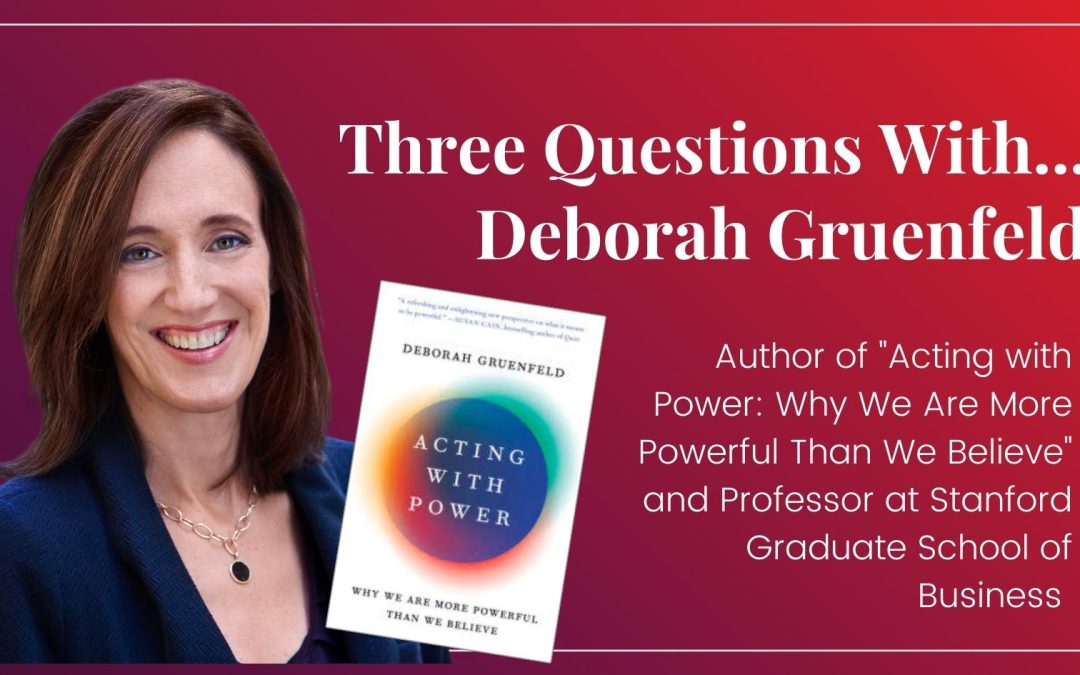This month we asked Deborah Gruenfeld, Professor at Stanford Graduate School of Business, about her book Acting with Power: Why We Are More Powerful Than We Believe:
Q: What is an example of “true power” and how can you use it for good?
Power is a necessary resource for anyone who aspires to have impact. Power refers to a person’s capacity to get others to do something, despite resistance. I like the term “smart power,” which comes from the field of international relations, but has much broader relevance. Smart power refers to a person’s ability to use both hardpower tactics — giving orders, threatening and sometimes using punishments, and interpersonal dominance — which arouse fear, and soft-power tactics, such as listening, developing partnerships and alliances, showing kindness, generosity, forgiveness and respect. Soft power tactics arouse feelings of love and admiration in others, and they help to legitimize power advantages. Some of us are more comfortable with hard-power tactics, while others are more comfortable using softpower.
To be maximally effective, I believe we should all aspire to master both. Many people think of power as a dark force. But power is just a tool, or means of accomplishing ends, and in that sense power can for good as well as evil. If those who care about the greater good are afraid to use power, we leave the bad guys in a much stronger position. Power can be used for selfish ends and it can just as easily and effectively be used with benevolence, to protect and advance the goals of those with less power.
Q: What are the most common instances in which people are unable to recognize their ability to make an impact?
When we are focused on our own needs and insecurities, or the fear that we are being misjudged and underestimated, we feel powerless, and that becomes our reality. When we are able to move our attention off of ourselves, and onto the needs and insecurities of those around us, the opportunities for impact become obvious. For example, when a new professor enters a classroom, he or she might feel unprepared, like an imposter, worried that attempts to establish credibility will fail. What we are missing in these situations is that our students are also insecure in those moments and what they want most is for us to be successful and to establish control of the classroom so they can relax and focus on learning. By simply staying focused on what students need from us in order to get what they came for, the power we have becomes obvious, palpable, and easier to handle.
Q: Do women, more so than men, underestimate their ability to act with power?
I’m always reluctant to over-generalize when talking about power and gender, as there is often more variation within genders than between. But some subtle differences have been identified. There is evidence that men are more comfortable with hierarchical relationships in general then women are. Men are more confident in themselves than women in many situations. But it has not been my experience that men feel more secure handling power than women do. Men and women do tend to respond differently to powerless feelings, based on the desire to adhere to gender expectations. Men are expected to appear strong at all times, so they are more likely to try to respond to threat or the fear of weakness by trying to over-power. They do things to make them appear bigger and more powerful than they feel. Women are expected to appear non-threatening, and it is more acceptable and can even be attractive for them to show weakness. Women often rely more on soft-power tactics for this reason. But this does not mean that women are less effective with power than men. Their tactics are more subtle, and interestingly, although men tend to be chosen over men for high-power roles, some studies show that women leaders receive higher effectiveness ratings than male leaders.
Q: What is one thing that you hope educators specifically take from your book?
We educate not just with content but with leadership, people are searching for role models, especially true for women. How do you carry yourself, what do you stand for, how do you respond to controversy in classes, hard and soft power both needed for trust.

